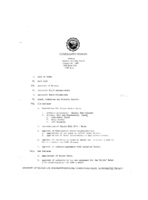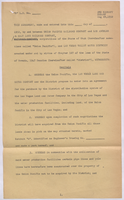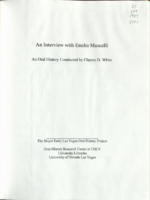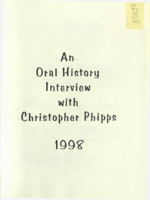Search the Special Collections and Archives Portal
Search Results

Meeting minutes for Consolidated Student Senate University of Nevada, Las Vegas, January 10, 1985
Date
Archival Collection
Description
Text

Contract between the Union Pacific and Los Angeles & Salt Lake Railroad Companies, and the Las Vegas Valley Water District, August 29, 1952
Date
Archival Collection
Description
Second redraft of contract for the Las Vegas Valley Water District to remove all power lines and water pipelines from railroad property after a yet to be agreed upon number of months.
Text

Sergio "Checko" Salgado oral history interview: transcript
Date
Archival Collection
Description
Oral history interview with Sergio "Checko" Salgado conducted by Laurents Bañuelos-Benitez, Barbara Tabach, Elsa Lopez, and Monserrath Hernández on June 4, 2019 for the Latinx Voices of Southern Nevada Oral History Project. Checko talks about his personal history that led him to pursue journalism and photography. He discusses his education and employment working in art galleries in Denver, Colorado and Las Vegas, Nevada and the various art exhibitions he has designed including in the Marjorie Barrick Museum at the University of Nevada, Las Vegas and in the Reynolds Senate Building in Washington, D.C.
Text

Charles Scott Emerson oral history interview: transcript
Date
Archival Collection
Description
Oral history interview with Charles Scott Emerson conducted by Claytee D. White on December 21, 2017 for the Remembering 1 October Oral History Project. In this interview, Charles Scott Emerson discusses his work with the American Red Cross and the disaster relief the organization provided during the aftermath of the October 2017 mass shooting in Las Vegas, Nevada. The interview begins with a discussion on Emerson's early life and career in Missouri and how he moved to Las Vegas in 2004. Emerson talks about the American Red Cross response plans and coordinated operations that are in place for when the community is faced with a disaster, going into specific detail on the community-wide response to the October 1, 2017 shooting. He gives a behind-the-scenes glimpse into how relief work is organized, using this interview as a chance to praise the hidden heroes of the October 2017 tragedy, including the people at the Family Assistance Center, the Attorney General's Office, the Driver's License Bureau, and the Coroner's Office, as well as mental health providers, child care workers, blood donors, and more. Throughout the interview, Emerson puts special emphasis on the importance of community in order to offer support in the aftermath of a tragedy as well as to prevent a man-made tragedy from occurring again.
Text

Louis Yoxen interview, 2003: transcript
Date
Archival Collection
Description
Yoxen begins her interview by discussing how she first arrived in Las Vegas, Nevada to work for the U.S. State Department in the 1950s. She then describes her childhood in Alabama, competing in the Miss America pageant, and her life in Miami, Florida. Yoxen also discusses living in North Africa and Berlin, Germany while working for the State Department as a clerk. She then talks about moving around with her sister and her family, and eventually coming to Las Vegas. She describes what Las Vegas was like in the 1950s. Yoxen ends her interview with a discussion on her family, her husband's work, and their recreational activities.
Text

Patricia Vazquez interview, November 14, 2018, June 14, 2019: transcript
Date
Archival Collection
Description
Session 1: Interviewed by Marcela Rodriguez-Campo. Barbara Tabach also participates in the questioning. Session 2: Interviewed by Rodrigo Vazquez. Monserrath Hernandez also participates in the questioning. Patricia Vazquez was born and raised in Las Vegas, NV and shares her experiences growing up in the Valley as a Queer Latina. At a young age, she remembers traveling back and forth between Mexico and the U.S. to visit family. When she started school she shares how her home language, Spanish, became her family's "secret language" as she began to learn English. During elementary school Patricia was tracked into the special education program, and remove from the mainstream classroom. She would find her love for learning in books and libraries as she taught herself how to read in English. Despite being tracked into less advanced courses, Patricia would end up taking AP/ Honors courses in high school after forging her favorite teachers signature, which changed her educational trajectory. After coming out to her family, Patricia went nearly a decade distanced from her mother and continued her college education at Arizona State University. There, she would complete a bachelors in painting and a masters in comparative literature. Her work with the Chicano Studies program at ASU helped her develop her Chicana identity and begin her involvement in social activism. In Las Vegas, she worked to fight for marriage equality and LGBTQ rights with the American Civil Liberties Union , and later with the Progressive Leadership Alliance of Nevada. She also conducted several lectures for the Latino Youth Leadership Conference on sexuality, gender, and homophobia for over a decade. She has served as an English Professor at the College of Southern Nevada for the last 20 years and is an avid hiker, traveler, and painter.
Text

Transcript of interview with Helen Early by Dale Forshee, February 26 & 27, 1979
Date
Archival Collection
Description
On February 26 and 27, 1979, Dale Forshee interviewed Helen Early (born 1919 in Des Moines, Iowa) about her life in Southern Nevada. Early first talks about her arrival to Las Vegas and the early development of the city. She also talks about some of the first businesses in Las Vegas, the initial development of the University of Nevada, Las Vegas, and the early nightclubs and casinos in the city. Early also discusses her work in establishing a school for disabled children before discussing other topics related to McCarran Airport, Bugsy Siegel, Senator Walter Baring, the first churches in Las Vegas, and the Helldorado Parade.
Text

Transcript of interview with Emilio Muscelli by Claytee D. White, November 25, 2008
Date
Archival Collection
Description
Emilio Muscelli was in his mid-80s when he sat for this oral history interview. With a thick Italian accent he recalled his career as a Las Vegas maitre d' that spanned decades of Strip history. Emilio arrived in America in 1948, landed a job at the Copacabana in New York City. His boss was Jack Entratter, who brought Emilio to Las Vegas when he opened the Sands in 1952. Over the decades he has witnessed the ups and downs of Las Vegas economy and has befriended many celebrities along the way. He reminisces during this interview about his friendship with singer Bobby Darin, actor Cary Grant and meeting a laundry list of others. He fondly speaks of those he worked for and their contribution to the growth of Las Vegas.
Text

Transcript of interview with Christopher Phipps by Dennis McBride, November 6, 1998
Date
Archival Collection
Description
Christopher Phipps, attorney in Las Vegas discusses his life. Hailing from Honolulu, Hawaii, and his adventure that led him to Las Vegas, Nevada.
Text

Transcript of interview with Ike Lawrence Epstein by Barbara Tabach, August 24, 2017 and February 2, 2018
Date
Archival Collection
Description
Ike Lawrence Epstein’s office at the recently opened UFC headquarters is sunlit and handsomely decorated. A black and white photo taken by the famous British photographer David Bailey of the Kray brother adorns the wall. Lawrence, as everyone knows him, is the son of Kenny Epstein and Donna Goldstein. He was born, in 1966, and raised in Las Vegas. He attended Vanderbilt University (BA 1989, JD 1992) and then returned to live full time in Las Vegas with his law degree in hand. In addition to being COO of the UFC, he is active in the family business, the El Cortez Hotel and Casino. In this oral history, Lawrence recalls his grandparents, their careers in Las Vegas, and his youthful favorite holidays being Passover and Thanksgiving. He became a bar mitzvah in Israel, a tradition he continues with his own children with Michelle Epstein. Lawrence serves the community as a board member of Meadows School and on the Stadium Board. As an executive with UFC [Ultimate Fighting Championship], Lawrence observes the overall magnitude of sports in Las Vegas in 2017, how it came to this point with professional sports, and what he envisions as the future possibilities of the city as an international sports destination.
Text
